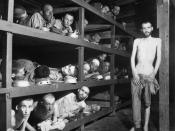"Night" by Elie Wiesel is a compelling story that presents to us with an unprecedented look into the life of the Holocaust victims. Elie Wiesel tells us about his world in Night in a way that incorporates other Jews impacted by the Holocaust. The real life horror during the Holocaust had literally turned Elie Wiesel into another person who he had never known before. Because of losing his dignity and innocence, Elie Wiesel's attitude had changed to unfaithful to God, hopeless to himself, and indifferent to others.
In 'Night', Elie Wiesel used to believe deeply in God and his Jewish faith, going so far as to study daily with a sage. He has grown up believing everything is a reflection of God's power. For instance, he used to think praying is just as natural as the way he "[breathes]" and "[lives]" (4). He believed that God was always just and merciful to His people.
However, there started to be a shift in his attitude when he was fifteen, where he and the rest of the Sighet Jews were oppressed by the Germans in the ghettos, later deported to the concentration camps in Auschwitz. Throughout the journey, most of the Jews kept reassuring themselves optimistically that God would never let them down, that God will keep them safe. On the other hand, Elie Wiesel soon lost his faith after he saw the flames from the crematorium and smelled the stink of the corpses in the damp, and remained cold whenever his surroundings prayed for justice and safety. He began to question his belief in God as he said "Why should I bless His name? The Eternal, Lord of the universe...What had I to thank him for?" (33) He could not understand how a just and merciful God could allow this...


